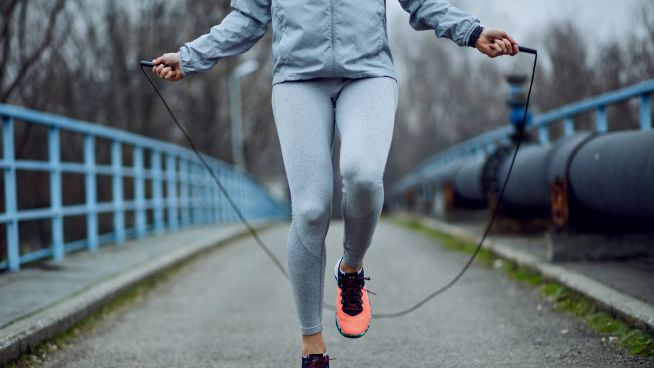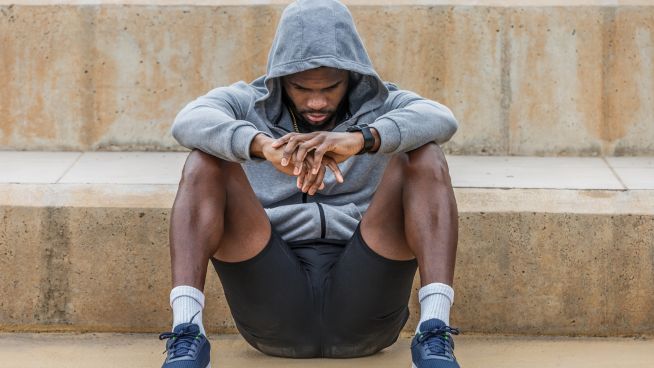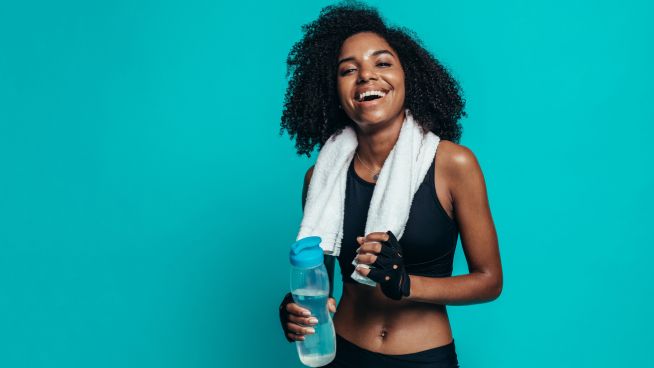9 Eating Essentials
Ask any expert: the best way to optimize your physical efforts is to eat correctly. Start with Jose Antonio, CEO of the International Society of Sports Nutrition and former vice president of the National Strength and Conditioning Association. He says, “Look at diet and exercise like a bicycle. The front wheel is the diet, [and] the back wheel is your training program. You can’t have a defective wheel…[if you do], you’re going to have a defective athlete.”
Here, along with two other experts — Dallas Mavericks head athletic trainer Casey Smith and University of California, Davis director of sports nutrition Liz Applegate, Ph.D. — Antonio asks [and answers] every question necessary to evaluate the strength of your diet.
1. What percentage of your daily diet includes carbs?
Ideal answer: About 55 to 60 percent of my total calories come from quality carbohydrates.
Why: The framework of your diet should be built mostly on carbohydrates. “[Carbohydrates] are the only nutrient that can be directly delivered to the muscles,” Smith says. For that reason, carbs are an absolute requirement, as they provide your body’s main source of energy.
Another benefit of carbs is that they spare the use of muscle protein during exercise, and, post-workout, they help rebuild your energy stores. Key carbohydrate sources include whole grains, like breads, rice, pasta and cereal; starchy vegetables, like baked or sweet potatoes, corn, squash and beans; and even fruits, like bananas, apples, oranges and grapes.
2. Does your diet include fats? If so, what types?
Ideal answer: Yes. Of my total caloric intake, no more than 20 to 30 percent come from “healthy” fats [i.e., unsaturated fats].
Why: Fat can also be used as fuel during activity. It cushions and protects vital organs and transports fat soluble vitamins A, D, E and K, which are stored in fatty tissue and the liver until your body needs them.
However, not all fats are equally healthy. Gravitate toward sources like nuts [almonds, walnuts, cashews], fatty fishes [tuna, salmon] and even peanut butter. Avoid foods like chips, donuts and other pastries, high fat meats like sausage and bacon, fried foods, and creamy sauces, because “they don’t have the quality nutrients that you’re looking for,” says Applegate, who also serves as the Oakland Raiders team nutritionist. Furthermore, high fat foods take longer to digest, which can ultimately weigh you down when you hit the field.
3. How much protein do you eat each day?
Ideal answer: 1.2 grams of protein per kilogram of body weight.
Why: Your muscles are what propel you during activity; and since muscles are made of protein, it’s critical to ingest them. Furthermore, protein facilitates the recovery process, as they repair and build muscles, produce antibodies for your immune system and enable muscle tissues to contract. If you don’t consume enough, you may become more prone to injuries or have a suppressed immune system, which, according to Applegate, leads to more frequent infections.
Antonio often sees sports diets lacking in protein, especially among endurance athletes. “I think that’s one category of athlete that historically has…undervalued [protein’s] importance,” he says.
The amount of protein you need may vary slightly, depending on your training goals. Use the aforementioned formula if you’re looking to maintain. If your goal is to gain lean mass, change the formula to between 1.4 and 1.8 grams per kilogram of body weight. Once you’ve determined your protein intake, hit up some of these top sources: lean meats [chicken, turkey, pork, roast beef], fish [salmon, tuna], eggs and dairy [milk, cheese and yogurt].
4. Do you take a multivitamin?
Ideal answer: Yes.
Why: Antonio recommends a multi for all athletes. “To me, it serves as an insurance policy against poor eating,” he says. “Most people eat well some of the time, and then they’ll eat awful other [times], so I think a multivitamin is good insurance against that.”
Micronutrients [i.e., vitamins and minerals] play a big role in your diet, especially for anyone looking to lose or maintain weight, including athletes in weight-class sports like boxing and wrestling. Notes Smith, “An athlete in a sport that has weight requirements may have particular needs that an athlete in a team sport like basketball may never have.”
“Take a wrestler who is in a weight class where he’s cutting weight, starving himself,” Antonio says, supporting Smith. “I would recommend that [he] take…at least a multivitamin, so that [he’s] getting some micronutrients.”
According to Applegate, football players are often interested in taking supplements, in part because they think their diets won’t provide what they believe they need—but a daily multi can help. “I always want football players to start with a great base of their diet…and I lay it out for them, what they need to do,” she says. “A supplement on top of that, for example a multivitamin, that’s a good idea to fill in the blanks of what you’re not getting enough of.”
Take for instance vitamin C. If your diet doesn’t get it or other antioxidants, you become more prone to muscle damage. Antonio says one good way to ensure that you get enough micronutrients is to down a multivitamin.
5. When and what do you eat pre- and post-activity?
Ideal answer: Two to four hours prior, a meal higher in carbs; a mix of protein and carbs immediately after.
Why: “Peak cardiovascular, strength and power are all dependent upon timely delivery of energy to the muscle,” Smith explains. “Proper nutrition is the very foundation of this.” In other words, feeding your body throughout the day will ensure that you maintain enough energy to fuel activity and recover from it, whether your sport is strength- or endurance-based.
Applegate recommends fueling up between two and four hours pre-workout. “What [athletes] should focus on is primarily carbohydrates and some protein—not the other way around,” she says. “And keep fat [intake] low to moderate.”
And when you’re packing your bag post-workout, pack your mouth, too—within 30 minutes to no more than an hour after activity. “Your muscles are more receptive to nutrients right after a workout,” Applegate says. “If you were so tired after your practice that you went and curled up on the couch and woke up three hours later, you [would’ve] lost that window of opportunity. You’ll still recover, but you won’t recover optimally.”
Intense activity depletes your glycogen stores; so immediately following a workout, your muscle glycogen must be normalized. The powerful duo of protein and carbs maximizes recovery by stimulating muscle tissue repair and protein synthesis. Research in Medicine & Science in Sports & Exercise supports downing a carbohydrate beverage with added protein, citing that together they significantly reduced muscle damage.
6. Do you know how to calculate your daily caloric needs?
Ideal answer: Yes
Why: Insufficient calories lead to nutrient deficiencies that hinder your body and, ultimately, your performance. If you don’t know how to figure the calories your body requires, Antonio suggests using the Harris-Benedict equation, available online at the website of Cornell University’s medical college. This equation uses an individual’s age, gender and exercise intensity, among other factors, to calculate caloric needs.
Once you know exactly what your body requires, you can’t dodge meals—a habit Applegate says she frequently encounters with athletes. “Diet has a very big impact on athletic performance,” she says. “If an individual, for example, [doesn’t get enough] fuel or calories, they won’t have the endurance or strength to do their particular event.”
As a note, if your goal is to pack on weight, Applegate says you need an extra 700 to 1,000 calories a day, which would allow you to gain a half pound to a pound a week.
7. How much fluid do you drink before, during and after activity?
Ideal answer: 13 to 20 ounces before; six to 12 ounces every 15 minutes during; and post-activity, at least 20 ounces for every pound lost.
Why: “Know where [you] stand to stay hydrated, because it can dramatically affect [your] performance. [Not enough fluid can lead] to muscle cramps, poor strength, poor endurance, lightheadedness—[ you] could even pass out on the field,” Applegate says.
An indicator of your hydration level: the color of your pee. Dark yellow means you should keep drinking fluids; pale yellow or nearly clear means you’re properly hydrated. One measure to help prevent dehydration is to sip a sports drink, especially if muscle cramps are cramping your ability. “Sports drinks play a role in helping to replenish fluids, some electrolytes and carbohydrates,” Applegate says. One crucial electrolyte is sodium, which helps regulate fluids in your body and minimizes muscle cramping.
8. Do you use supplements to replace eating whole foods in your diet?
Ideal answer: No; I use supplements to complement my diet.
Why: Dietary supplements are meant to do exactly that, supplement—meaning add to, not replace, the consumption of whole foods.
“Smart supplementation can improve the adaptive response to exercise, regardless of whether you’re male or female,” Antonio says.
However, the value of a dietary supplement varies, depending on the sport you play and your individual nutrition needs. For instance, if you’re a female athlete who practices a vegetarian diet, you face particular challenges—especially if your sport is endurance-based, such as cross country.
According to Antonio, athletes who are strict vegans [those who entirely eliminate all animal foods and dairy products] require specific supplementation to compensate for the lack of nutrients, specifically vitamin B12. Largely found in animal foods, this vitamin helps prevent anemia.
Applegate’s recommendation for veggies is a multivitamin with zinc and iron. Iron, a trace mineral required in small amounts, is very critical to the body since it helps transport oxygen to muscles. A study in the International Journal of Sport Nutrition and Exercise Metabolism indicates that antioxidant supplementation of vitamins E, C and beta-carotene helps prevent a decrease of iron.
9. Where do you spend your time in the grocery store?
Ideal answer: The outside aisles.
Why: Adequately balancing your diet with macro and micronutrients calls for what Antonio refers to as “clean eating.” Clean eating means unprocessed foods are the staples of your diet. For the most part, you can find these foods along the periphery of a grocery store. Think fruits, vegetables and lean proteins rather than packaged foods, like cookies, candy and chips, which are found in the middle aisles of a store.
RECOMMENDED FOR YOU
MOST POPULAR
9 Eating Essentials
Ask any expert: the best way to optimize your physical efforts is to eat correctly. Start with Jose Antonio, CEO of the International Society of Sports Nutrition and former vice president of the National Strength and Conditioning Association. He says, “Look at diet and exercise like a bicycle. The front wheel is the diet, [and] the back wheel is your training program. You can’t have a defective wheel…[if you do], you’re going to have a defective athlete.”
Here, along with two other experts — Dallas Mavericks head athletic trainer Casey Smith and University of California, Davis director of sports nutrition Liz Applegate, Ph.D. — Antonio asks [and answers] every question necessary to evaluate the strength of your diet.
1. What percentage of your daily diet includes carbs?
Ideal answer: About 55 to 60 percent of my total calories come from quality carbohydrates.
Why: The framework of your diet should be built mostly on carbohydrates. “[Carbohydrates] are the only nutrient that can be directly delivered to the muscles,” Smith says. For that reason, carbs are an absolute requirement, as they provide your body’s main source of energy.
Another benefit of carbs is that they spare the use of muscle protein during exercise, and, post-workout, they help rebuild your energy stores. Key carbohydrate sources include whole grains, like breads, rice, pasta and cereal; starchy vegetables, like baked or sweet potatoes, corn, squash and beans; and even fruits, like bananas, apples, oranges and grapes.
2. Does your diet include fats? If so, what types?
Ideal answer: Yes. Of my total caloric intake, no more than 20 to 30 percent come from “healthy” fats [i.e., unsaturated fats].
Why: Fat can also be used as fuel during activity. It cushions and protects vital organs and transports fat soluble vitamins A, D, E and K, which are stored in fatty tissue and the liver until your body needs them.
However, not all fats are equally healthy. Gravitate toward sources like nuts [almonds, walnuts, cashews], fatty fishes [tuna, salmon] and even peanut butter. Avoid foods like chips, donuts and other pastries, high fat meats like sausage and bacon, fried foods, and creamy sauces, because “they don’t have the quality nutrients that you’re looking for,” says Applegate, who also serves as the Oakland Raiders team nutritionist. Furthermore, high fat foods take longer to digest, which can ultimately weigh you down when you hit the field.
3. How much protein do you eat each day?
Ideal answer: 1.2 grams of protein per kilogram of body weight.
Why: Your muscles are what propel you during activity; and since muscles are made of protein, it’s critical to ingest them. Furthermore, protein facilitates the recovery process, as they repair and build muscles, produce antibodies for your immune system and enable muscle tissues to contract. If you don’t consume enough, you may become more prone to injuries or have a suppressed immune system, which, according to Applegate, leads to more frequent infections.
Antonio often sees sports diets lacking in protein, especially among endurance athletes. “I think that’s one category of athlete that historically has…undervalued [protein’s] importance,” he says.
The amount of protein you need may vary slightly, depending on your training goals. Use the aforementioned formula if you’re looking to maintain. If your goal is to gain lean mass, change the formula to between 1.4 and 1.8 grams per kilogram of body weight. Once you’ve determined your protein intake, hit up some of these top sources: lean meats [chicken, turkey, pork, roast beef], fish [salmon, tuna], eggs and dairy [milk, cheese and yogurt].
4. Do you take a multivitamin?
Ideal answer: Yes.
Why: Antonio recommends a multi for all athletes. “To me, it serves as an insurance policy against poor eating,” he says. “Most people eat well some of the time, and then they’ll eat awful other [times], so I think a multivitamin is good insurance against that.”
Micronutrients [i.e., vitamins and minerals] play a big role in your diet, especially for anyone looking to lose or maintain weight, including athletes in weight-class sports like boxing and wrestling. Notes Smith, “An athlete in a sport that has weight requirements may have particular needs that an athlete in a team sport like basketball may never have.”
“Take a wrestler who is in a weight class where he’s cutting weight, starving himself,” Antonio says, supporting Smith. “I would recommend that [he] take…at least a multivitamin, so that [he’s] getting some micronutrients.”
According to Applegate, football players are often interested in taking supplements, in part because they think their diets won’t provide what they believe they need—but a daily multi can help. “I always want football players to start with a great base of their diet…and I lay it out for them, what they need to do,” she says. “A supplement on top of that, for example a multivitamin, that’s a good idea to fill in the blanks of what you’re not getting enough of.”
Take for instance vitamin C. If your diet doesn’t get it or other antioxidants, you become more prone to muscle damage. Antonio says one good way to ensure that you get enough micronutrients is to down a multivitamin.
5. When and what do you eat pre- and post-activity?
Ideal answer: Two to four hours prior, a meal higher in carbs; a mix of protein and carbs immediately after.
Why: “Peak cardiovascular, strength and power are all dependent upon timely delivery of energy to the muscle,” Smith explains. “Proper nutrition is the very foundation of this.” In other words, feeding your body throughout the day will ensure that you maintain enough energy to fuel activity and recover from it, whether your sport is strength- or endurance-based.
Applegate recommends fueling up between two and four hours pre-workout. “What [athletes] should focus on is primarily carbohydrates and some protein—not the other way around,” she says. “And keep fat [intake] low to moderate.”
And when you’re packing your bag post-workout, pack your mouth, too—within 30 minutes to no more than an hour after activity. “Your muscles are more receptive to nutrients right after a workout,” Applegate says. “If you were so tired after your practice that you went and curled up on the couch and woke up three hours later, you [would’ve] lost that window of opportunity. You’ll still recover, but you won’t recover optimally.”
Intense activity depletes your glycogen stores; so immediately following a workout, your muscle glycogen must be normalized. The powerful duo of protein and carbs maximizes recovery by stimulating muscle tissue repair and protein synthesis. Research in Medicine & Science in Sports & Exercise supports downing a carbohydrate beverage with added protein, citing that together they significantly reduced muscle damage.
6. Do you know how to calculate your daily caloric needs?
Ideal answer: Yes
Why: Insufficient calories lead to nutrient deficiencies that hinder your body and, ultimately, your performance. If you don’t know how to figure the calories your body requires, Antonio suggests using the Harris-Benedict equation, available online at the website of Cornell University’s medical college. This equation uses an individual’s age, gender and exercise intensity, among other factors, to calculate caloric needs.
Once you know exactly what your body requires, you can’t dodge meals—a habit Applegate says she frequently encounters with athletes. “Diet has a very big impact on athletic performance,” she says. “If an individual, for example, [doesn’t get enough] fuel or calories, they won’t have the endurance or strength to do their particular event.”
As a note, if your goal is to pack on weight, Applegate says you need an extra 700 to 1,000 calories a day, which would allow you to gain a half pound to a pound a week.
7. How much fluid do you drink before, during and after activity?
Ideal answer: 13 to 20 ounces before; six to 12 ounces every 15 minutes during; and post-activity, at least 20 ounces for every pound lost.
Why: “Know where [you] stand to stay hydrated, because it can dramatically affect [your] performance. [Not enough fluid can lead] to muscle cramps, poor strength, poor endurance, lightheadedness—[ you] could even pass out on the field,” Applegate says.
An indicator of your hydration level: the color of your pee. Dark yellow means you should keep drinking fluids; pale yellow or nearly clear means you’re properly hydrated. One measure to help prevent dehydration is to sip a sports drink, especially if muscle cramps are cramping your ability. “Sports drinks play a role in helping to replenish fluids, some electrolytes and carbohydrates,” Applegate says. One crucial electrolyte is sodium, which helps regulate fluids in your body and minimizes muscle cramping.
8. Do you use supplements to replace eating whole foods in your diet?
Ideal answer: No; I use supplements to complement my diet.
Why: Dietary supplements are meant to do exactly that, supplement—meaning add to, not replace, the consumption of whole foods.
“Smart supplementation can improve the adaptive response to exercise, regardless of whether you’re male or female,” Antonio says.
However, the value of a dietary supplement varies, depending on the sport you play and your individual nutrition needs. For instance, if you’re a female athlete who practices a vegetarian diet, you face particular challenges—especially if your sport is endurance-based, such as cross country.
According to Antonio, athletes who are strict vegans [those who entirely eliminate all animal foods and dairy products] require specific supplementation to compensate for the lack of nutrients, specifically vitamin B12. Largely found in animal foods, this vitamin helps prevent anemia.
Applegate’s recommendation for veggies is a multivitamin with zinc and iron. Iron, a trace mineral required in small amounts, is very critical to the body since it helps transport oxygen to muscles. A study in the International Journal of Sport Nutrition and Exercise Metabolism indicates that antioxidant supplementation of vitamins E, C and beta-carotene helps prevent a decrease of iron.
9. Where do you spend your time in the grocery store?
Ideal answer: The outside aisles.
Why: Adequately balancing your diet with macro and micronutrients calls for what Antonio refers to as “clean eating.” Clean eating means unprocessed foods are the staples of your diet. For the most part, you can find these foods along the periphery of a grocery store. Think fruits, vegetables and lean proteins rather than packaged foods, like cookies, candy and chips, which are found in the middle aisles of a store.












